Key takeaways:
- Privacy advocacy aims to empower individuals to regain control over their personal information and requires ethical practices focusing on empathy and integrity.
- Key principles of privacy include informed consent, data minimization, and transparency, which enhance user trust and engagement.
- Challenges in privacy advocacy include rapid technological advancements, public apathy towards privacy issues, and the tension between privacy and security measures.
- Personal motivation for advocacy stems from witnessing the impact of privacy violations and a desire to promote awareness and education around privacy rights.

Understanding privacy advocacy
Privacy advocacy is about more than just protecting data; it’s a movement aimed at empowering individuals to reclaim control over their personal information. I remember the first time I realized how freely we share our lives online. It struck me—how often do we stop to think about what that means for our privacy?
When I began to dive deeper into privacy advocacy, I often found myself questioning the ethics behind data collection practices. Why do companies need so much information about us? The more I learned, the more I felt a responsibility to educate others, prompting me to share my insights in local workshops. This sense of duty to inform stemmed from my own experiences of feeling overwhelmed by the digital landscape.
As I engaged with others on this journey, I discovered a shared sense of urgency in addressing privacy issues. People often expressed frustration and confusion about their rights and the complexities of privacy laws. This collective struggle highlighted how vital it is for advocates to not only fight for policy change but also to provide clear, accessible information that empowers people to make informed decisions about their privacy.
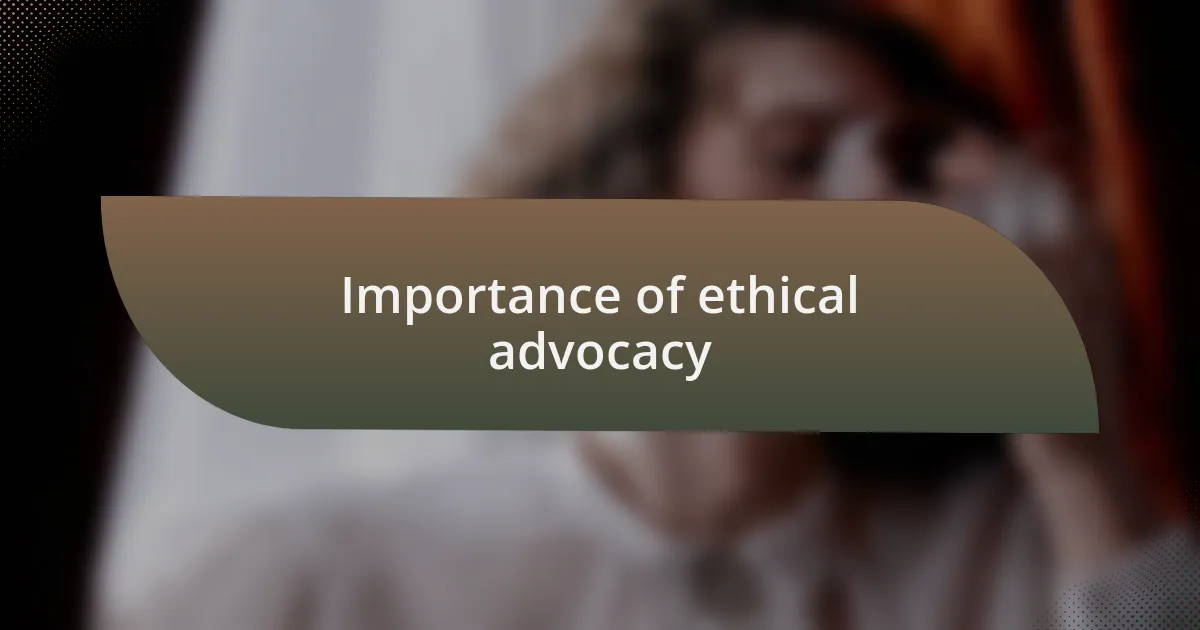
Importance of ethical advocacy
Ethical advocacy is crucial because it ensures that the voices of those affected by privacy issues are heard. I remember attending a community meeting where a woman shared how her identity was stolen due to inadequate data protection. Her story resonated with everyone, illuminating the real-life consequences of neglecting ethical standards in data handling. This experience reinforced my belief that advocacy should always center on empathy and integrity, pushing us to prioritize people over profit.
Moreover, ethical advocacy fosters trust between individuals and organizations. When advocates hold themselves to high moral standards, it creates a foundation of credibility. This became evident to me when a local non-profit I collaborated with gained community support after being transparent about their data practices. People were more willing to engage and share their opinions, knowing their privacy was respected. It made me realize that ethical advocacy isn’t just about what we fight against; it’s also about building relationships founded on respect and understanding.
Lastly, embracing ethical principles in advocacy can inspire broader systemic change. I often reflect on how conversations around ethics can lead to innovations in privacy practices. For example, during a workshop I hosted, participants brainstormed solutions that not only protected privacy but also enhanced user experiences. It was invigorating to see how ethical advocacy could spark creativity and motivate us to rethink how we handle data, showcasing that prioritizing ethics doesn’t hinder progress—it propels it.
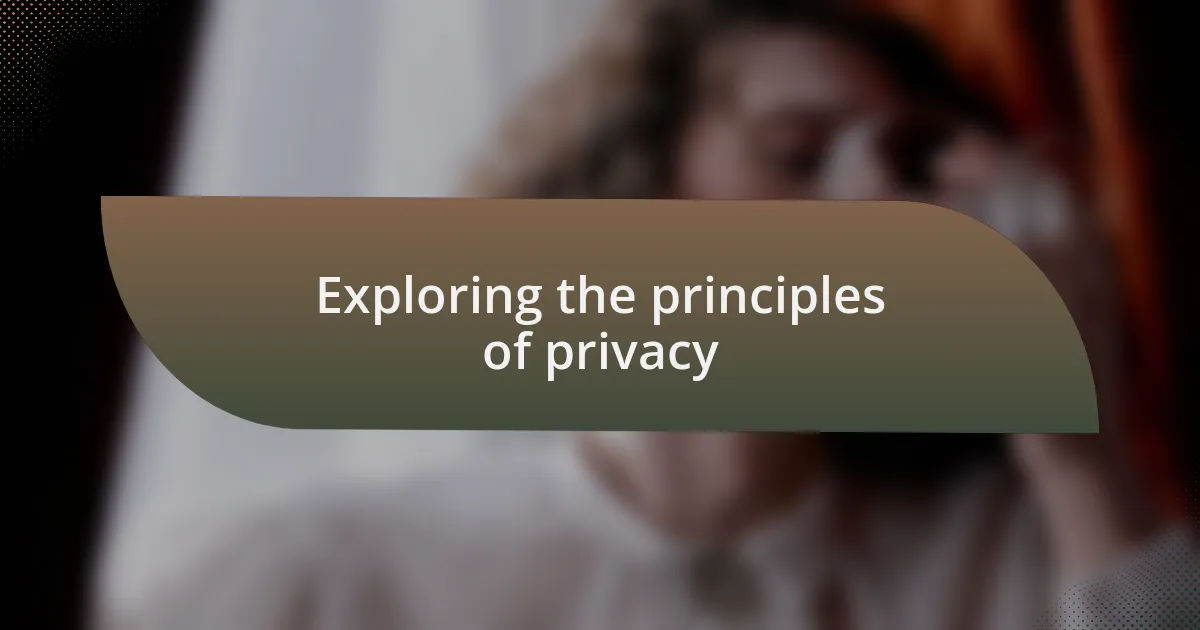
Exploring the principles of privacy
One of the fundamental principles of privacy is the concept of consent. I’ve often reflected on my interactions with technology; when I install an app, I usually fly through the consent forms, but I can’t help but wonder: Do I really understand what I’m agreeing to? This realization hit me hard when a friend shared a story about how a seemingly harmless app was collecting personal data extensively. It underscored that consent must be informed and meaningful, not just a checkbox.
Another critical principle is data minimization. My experience has taught me that collecting less is often more. I recall a project where we aimed to create a user-friendly platform, but kept hitting roadblocks because we wanted far more information than what was necessary. Once we adjusted our approach to collect only essential data, not only did user trust increase, but we also streamlined our processes. It was a win-win situation, showing me that respecting privacy doesn’t just protect users; it also simplifies our own work.
Transparency is yet another cornerstone of privacy principles. I remember attending a conference where a speaker emphasized how openness in data practices builds trust. It dawned on me that companies often bury their privacy policies in legalese, alienating users instead of engaging them. This resonates with my belief that if organizations took the time to explain their data usage clearly, it would empower users to make informed decisions. Isn’t it time we shift the narrative from data concealment to data clarity?
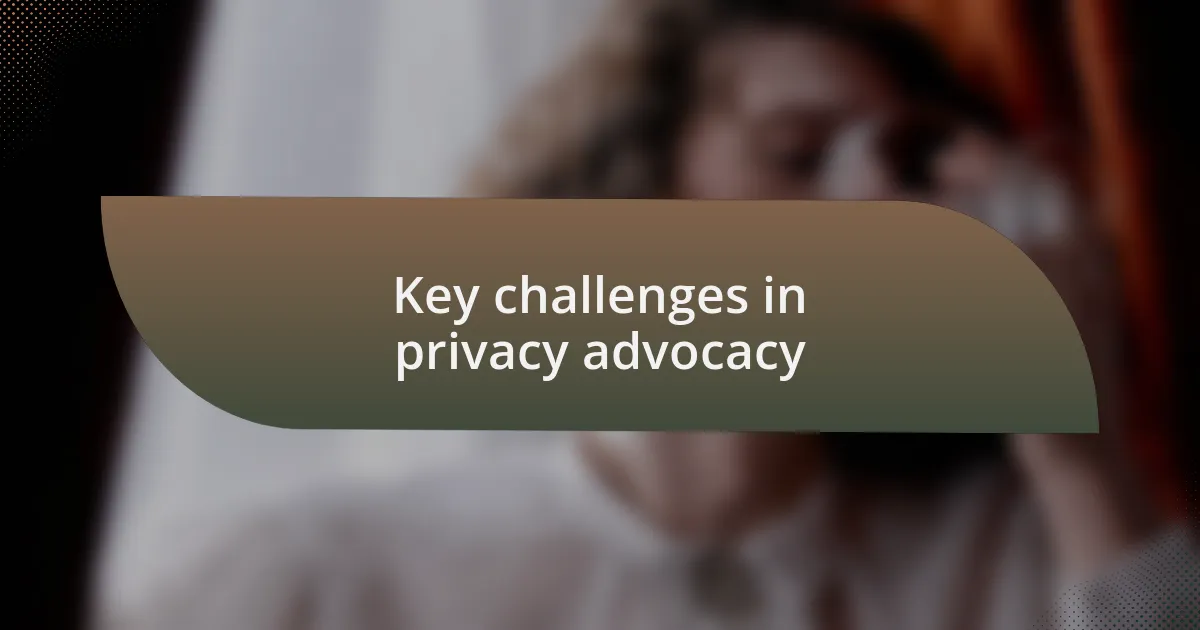
Key challenges in privacy advocacy
Privacy advocacy faces numerous challenges that can feel overwhelming at times. One significant obstacle is the constant evolution of technology, which often outpaces regulations. I remember grappling with this during a data breach incident where the affected company hadn’t anticipated the rapid advances in data collecting techniques. It left me wondering: How can we protect privacy when new tools emerge faster than we can enact protective measures?
Another hurdle is the widespread apathy toward privacy issues. During my journey, I’ve encountered people who dismiss privacy concerns as trivial or unimportant. I recall a casual conversation with a colleague who shrugged off the latest privacy scandal, saying, “I have nothing to hide.” It struck me then how crucial it is to foster a culture where individuals value their privacy and understand its implications for their daily lives. Shouldn’t we all care about protecting our personal information?
Finally, a challenge that weighs heavily on my mind is navigating the fine line between privacy and security. There have been instances when I’ve been caught in the debate about whether sacrificing some privacy is justified for increased security measures. This internal conflict highlights the complexities of advocating for privacy in an environment that often prioritizes safety. How do we convince others of the importance of privacy when security rhetoric is so loud and pervasive?
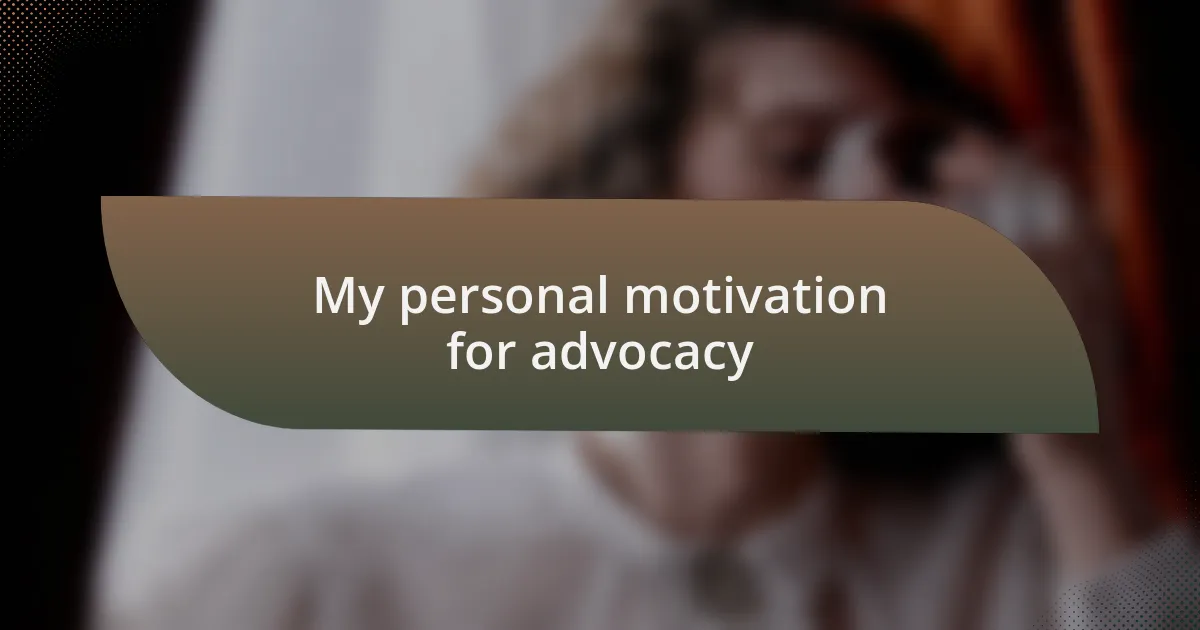
My personal motivation for advocacy
My journey into advocacy is fueled by a deep-rooted belief that everyone deserves to have control over their personal information. I still vividly remember the moment I realized how much data we unwittingly share and how it can be exploited. That unsettling knowledge ignited a passion within me to ensure that we can navigate our digital lives with confidence and security.
Witnessing the impact of poor privacy practices on individuals has become a major motivator for me. I once spoke with a friend who had her identity stolen due to a careless data leak. Her distress and the long, frustrating process of recovery opened my eyes to the real consequences of privacy violations. I often ask myself: how many lives are affected silently by these failures? It pushes me to advocate for stronger protections for others who might face similar situations.
Moreover, my motivation is intertwined with a desire to promote awareness and education around privacy rights. During several community workshops I’ve hosted, I’ve seen attendees light up when they realize their rights regarding personal data. That spark of understanding reassures me that advocacy can inspire change. If I can get just one person to think critically about their digital footprint, then I’m making a difference.
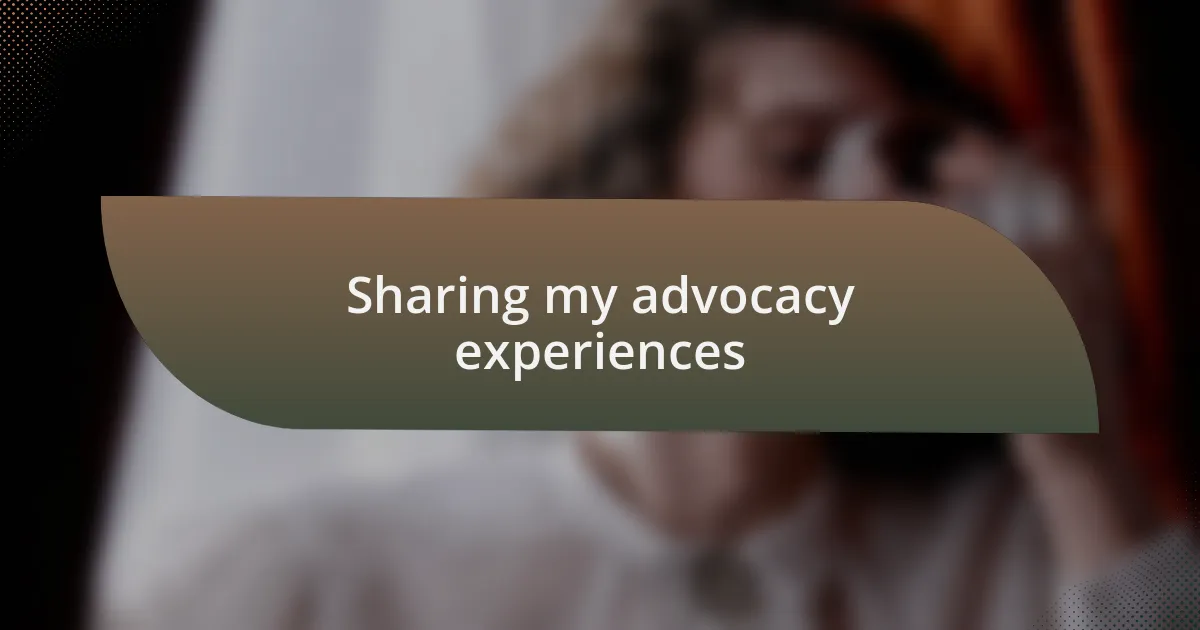
Sharing my advocacy experiences
I believe sharing my advocacy experiences is crucial for fostering a deeper understanding of privacy issues. There was a time when I attended a tech conference, eager to learn and share knowledge. During a breakout session on data ethics, I met a group of passionate young advocates who opened up about their own encounters with privacy violations. Hearing their stories was like a wake-up call for me; it reminded me that we are not alone in our struggles. How often do we dismiss the weight of collective experiences?
In my advocacy journey, I’ve had the chance to speak at various events, which not only amplified my voice but also gave others the platform to share theirs. At one particular workshop, a participant recounted how a simple misunderstanding about app permissions led to a breach. Their vulnerability and willingness to share made the atmosphere feel electric. It struck me then, how stories can spark change and rally diverse voices together. Isn’t it powerful to think that we can learn from each other’s missteps?
Moreover, I consistently engage in dialogues on social media, sharing updates and resources. I recall a post where I shared a personal experience of challenging a company’s data policy. The responses were overwhelming, with many people thanking me for shedding light on an issue they hadn’t considered. It was a beautiful reminder of the interconnectedness we share. How can we leverage our experiences to foster a more aware community? In these moments, I firmly believe that sharing our journeys can galvanize others to find their voice in the advocacy landscape.